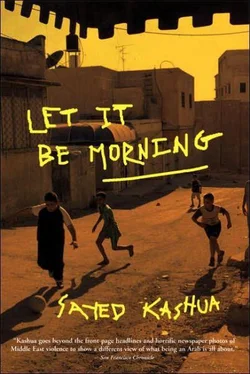Every now and then I go outside and look at the sections of the village that stretch across from my parents’ home as far as I can see. There is black smoke rising in a few places, and lots of people roaming about aimlessly, undeterred by the filth, the rivulets of sewage and the endless swarms of flies.
My father and two brothers decide to go into the town, to check things out, or so they say. I consider joining them but my wife looks at me, her expression a plea not to leave her on her own. “I want us to go to my parents’, to see how they’re doing,” she says, looking exhausted and drawn. “I’d like you to drive me there, please.”
We get into the car. She doesn’t fasten the baby’s seat belt the way she always does but holds her in her lap and sits next to me in the front seat. Suddenly the car seems like a bubble from another world. I turn on the air conditioner and the radio too, looking for a station that plays music, and the whole car, with a pleasant fragrance lingering inside it, becomes an island of sanity, giving both of us, my wife and myself, a whiff of our lives before the current situation. The trip in the air-conditioned car makes us forget our sorrow over the present reality and gives me some hope. It reminds me that my life normally looks very different from what it has looked like over the past few days. I learn to appreciate it now and hope it goes back to what it was very soon. For a few minutes there’s also the hope, which I’d already begun to consider a delusion, that everything will blow over soon and things will go back to the way they were. I try to convince myself to treat all the events of the past few days like a story, a major spread that will win me back my position at the paper and put me in my rightful place on the front pages. “What are you so worried about?” I ask my wife, and even manage a smile. “Things will be okay. Listen to the radio. They’re playing music. Everything’s fine.”
“Now I’m the one who’s worried and you’re the one who’s calm. How do you explain that? Earlier, when you were panicking, everyone thought you were crazy, and now, when everyone’s on edge, you behave as if nothing’s wrong?”
“What could be wrong? They’re not out to destroy us, or else they could have done that within hours. I promise you the gag order will be lifted soon and we’ll find out what made them do it. I’m sure it’s something really trivial and we’ll all wind up laughing about it.”
“My gut feeling is that things are going to be bad, nothing is going to be the way it was before.”
I know, I think, nothing is going to be the way it was. That’s for sure. But what’s the point of adding to my wife’s worries now? She looks at the kids roaming the streets, watching the last traces of the fires outside the public buildings and the stores. The eyes of the children don’t seem to reflect any fear, which is more than I can say about the adults. They’re bound to be hungry and thirsty, but I guess that children like these, who spend most of their time in the streets, see any new situation as cause for celebration. It’s as if their current setting is better suited to them than the seemingly peaceful lives they led in the village until recently. You can see them deep in conversation or having an argument, trying to outdo one another in the number of fires they’d seen or the number of spent shells they’d found from soldiers and criminals. They show off their collections and take special pride in the larger specimens, those from the soldiers. Some of the kids are riding their bikes barefoot, trying to keep up with the car, holding on to the handlebars with one hand and displaying their bullets in the other. Smiling, they let me and every passerby see their loot. Who knows, maybe they’re the ones who stole the water from our tank.
Getting to my wife’s parents’ home isn’t easy. The main road is blocked. People in this stinking village prefer to keep driving to the last drop of gas. They couldn’t care less that they’ll wind up leaving their car in the middle of the road, blocking it. As far as they’re concerned, if they can’t go anywhere, then neither should anyone else. Then again, a few of the drivers who have run out of gas have gone to the trouble of pushing their cars to the side of the road, and the side street leading to my wife’s parents’ home isn’t blocked. Ever so slowly I manage to wend my way between the cars scattered along the road. It’s incredible how inconsiderate people can be sometimes.
My wife and mother-in-law burst into tears when they see each other. They hug each other tightly and sob. My father-in-law paces nervously and mutters, “What good is that going to do, what’s the point of crying now?” Ashraf comes out of his room, looking very tired. He hasn’t shaven in days. He tries to give his usual smile but it looks different now. I’ve never seen him this way. He shakes my hand and asks, in Hebrew as usual, “What’s up, Uncle?” Then he asks if I’ve got a cigarette, and I can tell how uncomfortable he is having to ask.
“Yes,” I say, and pull out a pack that’s almost full. “I’ve got plenty of cigarettes. I guess it’s the only thing I won’t be short of,” I say in an attempt to make him feel better about it. I want to make sure he’s not embarrassed, because I really do have enough.
My wife and her parents are sitting on mattresses on the living room floor, discussing the events of the past few days. Ashraf and I go outside. We sit on the steps and smoke our cigarettes. He looks shattered, which isn’t too surprising.
“Don’t worry,” I tell him. “Things will work out okay.”
He watches me exhale and breaks into tears. It’s the first time I’ve seen him cry. “What’s going to work out okay? They must have brought in someone to replace me in the phone company by now,” he says. “It took me forever to find that job and now, just like that, because of something that has nothing to do with me, I’ll lose it.” He wipes away his tears. I know how hard it was for him to find that job after he graduated from the university, and that he couldn’t find anything in his field. Far from it. Customer service doesn’t require any education, but I can still remember how happy he and his family were when he finally found it. To tell the truth, I was kind of surprised that in our situation a person would still be thinking about the problem of losing a job. People barely have enough to drink. Every trace of a normal modern life has disappeared, and here he is, crying over the possibility that he may have lost a job that had paid him minimum wage.
“It’s all because of those sons of bitches,” he says. “I’m telling you, it’s all because of those thugs who’re walking around waving their Uzis like heroes. I know a lot of people think what the Israelis are doing to this village is on account of the Islamic Movement or terrorists who are hiding out here, but that’s bullshit. What the government is looking for are gangs. They’ve figured out that there are more weapons in this village than in the entire West Bank. It’s probably beginning to get to them by now, because the gangs have begun selling weapons to the Hamas. The government used to do everything possible to make sure that everything involving crime or drugs or weapons and every kind of shit the country had to offer would stay in the Arab villages, and now they’ve realized it’s gotten out of control. They gave them free rein, not a single damn cop came into the village. You could call the police and report a dead body in your backyard and it would take them five hours to get there, after they’d made sure it wasn’t dangerous and that there was no chance anyone would object. Now they know that only the army and the tanks and roadblocks can solve the problem.
Читать дальше












